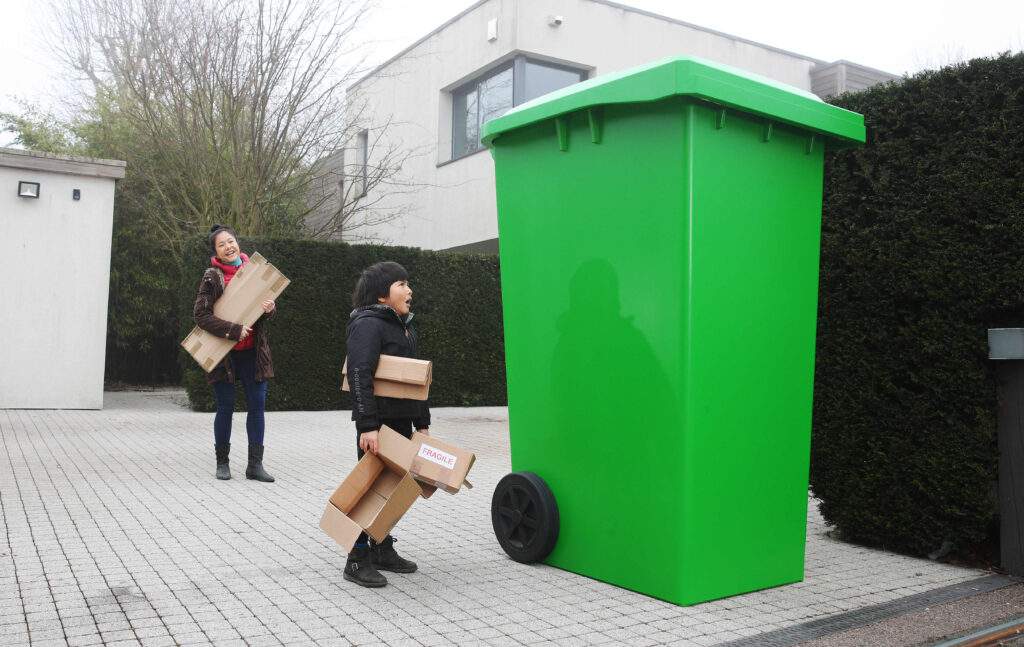Giant green recycling bin highlights the problems with the UK’s recycling infrastructure

New research has revealed a recycling crisis in the UK with households simply running out of room in their bins and unable to recycle properly.
As bins bulge due to increased online shopping and extended time at home, nearly half of households (49%) admit to completely running out of space in their recycling bins with a quarter saying this happens every two weeks or more.
However, this is just the tip of the iceberg according to leading recycling and packaging company DS Smith, which says that the UK’s recycling infrastructure is not equipped to deal with the increased volume of home recycling, caused in part by Covid-19. DS Smith says that as we see ever increasing packaging coming into our homes, we need to make sure that we have the right infrastructure in place to deal with it.
The company’s research shows that the increase is caused by radical changes in how we have been shopping and living during Covid-19. Online shopping was on the rise before Covid-19 but has been rapidly accelerated by the pandemic, indeed 70% of Brits say they have shopped online more since the initial lockdown in March 2020. Of those Brits who had seen an increase in their recycling, nearly two thirds (64%) say it’s because they’re spending more time at home as offices and schools have been shut, with nearly half of respondents (48%) citing increased online shopping for their overflowing bins.
With online shopping firmly here to stay (83% of Brits plan to shop online at the same level or more post lockdown) and home working looking set to continue to play a big role in our lives (research from the CIPD reveals employers expect the number of staff working from home in the future to double in comparison to pre- pandemic levels (1)) – our recycling infrastructure is desperate for reform.
Rogier Gerritsen, Managing Director of Recycling at DS Smith added, “Even before the pandemic, we were making the switch to online shopping and working from home more, but restrictions due to Covid-19 have revolutionised these trends. With many of these changes looking set to stay, including our new recycling habits, we need to ensure that our collections infrastructure enables us to recycle as much material as possible from our domestic streams.
“We applaud the Government for its ambitious recycling targets, but at the moment we’re not on track: based on current recycling trends our data suggests that we’ll only meet the 65% recycling target for municipal waste in 2048, over 10 years too late. As part of plans to build back better, we need to work together to build a consistent recycling infrastructure that has separate collections at the very heart of it – specifically separate collections for paper and cardboard. This would help accelerate the UK closer to its recycling aspirations
“Consistency around recycling collections would also make it easier to improve recycling labelling, paving the way for a system where all packaging and collection infrastructures would have standardised recycling labels that sufficiently informs the consumer about what materials can be recycled where.”
To highlight the problem, DS Smith has created a larger-than-life recycling bin which demonstrates the scale of changes needed.
The company’s research also reveals that nearly half of Brits (47%) say their recycling facilities need to be bigger and more than one in 10 (12%) admit to putting excess recycling into the rubbish bin, meaning it likely will end up in landfill or incineration.
Furthermore, over a third (35%) are embarrassed by the waste they produce with over half of those (51%) saying it is because their households are producing too much. In fact, close to three-quarters (74%) reported concern around the impact of excess waste on the environment. Many also have concerns about infrastructure, with over a third of respondents (38%) worried that their recycling isn’t being dealt with properly and is ending up in landfill or being incinerated. Seven in 10 (70%) of those surveyed agree that we urgently need more information about what we can and cannot recycle.
Brits are also well aware that some materials are better than others: nearly half (49%) want to try to use more cardboard or paper-based packaging rather than plastic-based packaging because it is more easily recycled.
Top items which people reported recycling more of since the COVID-19 pandemic include: online shopping packaging (38%), hand soap containers (30%), and toilet rolls (25%).




